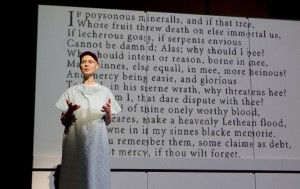Cynthia Nixon brings vitality to ‘Wit,’ now playing on Broadway

Margaret Edson’s Wit is a carefully constructed portrait of a solitary life facing its painful, cathartic end. We view this dismantling of the spirit through the eyes of a university professor with terminal ovarian cancer. Vivian Bearing (Cynthia Nixon of Sex and the City) has no problem telling the occasional passerby that she’s a literary scholar and has achieved a certain level of distinction that is unmatched by her peers. She’s razor sharp with her witty comments and refuses to dumb down her conversations, no matter the setting or subject matter. In other words, she’s a hard-headed person who probably isn’t the best candidate for a rigorous, debilitating chemotherapy treatment.
As the going gets rough — and in Edson’s play, the going gets extremely rough — Bearing loses her bearings. Here’s a woman who has shielded herself with vocabulary and punctuation her entire professional life. So how does she face a humiliating gynecological examination? How does she put her life in the hands of a novice doctor who used to be a student of hers at the university? How does she connect with living, breathing humans, people who live beyond the scope of a textbook or tome of poetry?
The cancer is eating away her insides, but Bearing’s most unendurable obstacle is the slow peeling away of her defense mechanisms. She’s not in her element. She does’t have a class of degenerate college students. She doesn’t have her poetry books, although she still has memories of the inspirational John Donne and his sonnets.

At first, Bearing casts the hospital setting like a classroom, or, more appropriately, like a play. The doctors and nurses co-mingle with her thoughts and memories, so much so that flashbacks fade right into the present time and vice versa. We’re never left out of the conversation because Bearing talks to us throughout the duration of Wit, offering tidbits like a color commentator. If a character uses the wrong word, expect a behind-the-back rebuttal. If a doctor seems slow to diagnose, one could imagine the illustrious scholar writing an “F” on his medical chart.
As the end nears, this gloriously complex character begins losing her battle to outwit the situation. She can’t write away the cancer. She can’t approach her pain and frustration from a poet’s perspective, especially after the diagnosis has become concrete. Stuck to her hospital bed, unable to advance her career any further, Bearing becomes something she never knew she could become: A frail human with misgivings and doubt.
As a concept, Wit is extraordinary. As a play, it’s effective. The one-hour-40-minute piece never falls into the sentimental trap like so many other cancer stories, and it never places a warm glow around the disease and its aftermath. When Bearing hurts, she screams. When the end comes, the story doesn’t fade into black and skip a few days to the funeral. We are here with this woman, always watching, always studying.
Nixon is a revelation in the part. She speaks her many monologues like a professor before a class of students (I would pay money to see her spar against Alan Rickman’s character in the new Broadway play, Seminar). One can tell the character enjoys using the power of language.
Nixon plays her as a woman who has consciously shut herself off from the rest of the world, so much so that interactions with others become as difficult as understanding the intentions of a comma placed by a poet more than 100 years ago.
Lynne Meadow directs the piece at the Manhattan Theatre Club’s Samuel J. Friedman Theatre with little frills or exaggeration. All of the action takes place center stage, and scenes come and go thanks to a rotating set designed by Santo Loquasto. The director and her creative team know that the play works if the actress at its center is able to connect with the character. Nixon achieves this goal, and that’s in no small part because of Edson’s beautiful words.
It may be approaching its 20th anniversary, but Wit still has a lot to say. Oddly, any thoughts on the afterlife are missing from the one-act piece. Bearing doesn’t strike one as the religious type, and as she faces her death, the character never wonders about God or heaven or hell. This insistence on never touching upon the issue is somewhat frustrating, especially when coupled with the play’s final image, which seems wrapped in Christian imagery. It’s a puzzlement why Meadow and Edson close the show with such a head-scratcher, but then again, Bearing is the type of person who wants us all to think deeper.
By John Soltes / Publisher / John@HollywoodSoapbox.com
-
Wit
-
Written by Margaret Edson
-
Directed by Lynne Meadow
-
Starring Cynthia Nixon, Michael Countryman, Suzanne Bertish, Carra Patterson, Pun Bandhu, Jessica Dickey, Chiké Johnson, Zachary Spicer and Greg Keller
-
Running time: 100 minutes
-
Currently playing at Manhattan Theatre Club’s Samuel J. Friedman Theatre at 261 W. 47th St. in New York City. Tickets start at $57. Click here for more information.
-
Rating:





